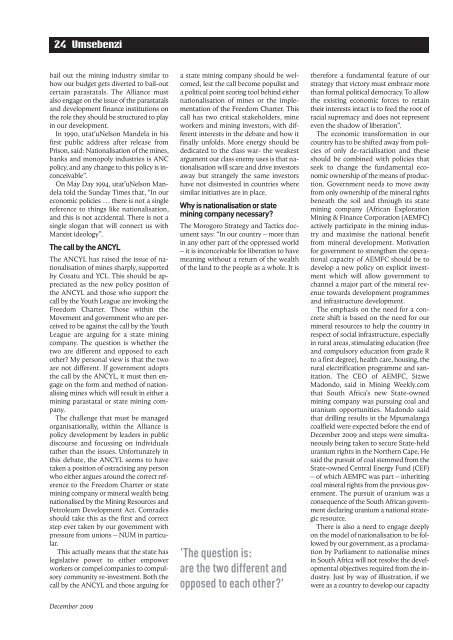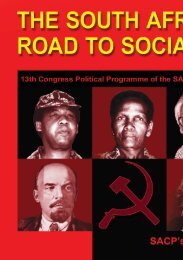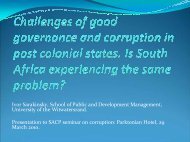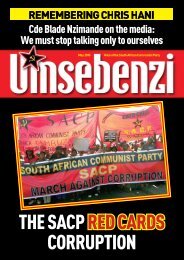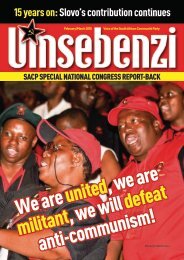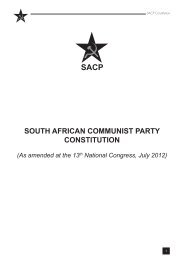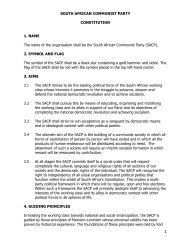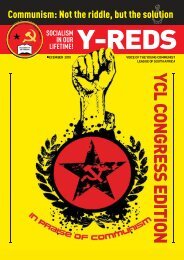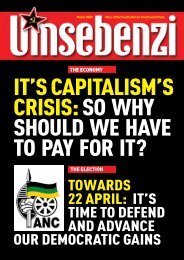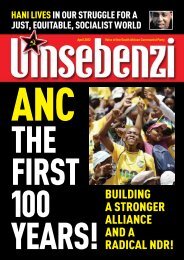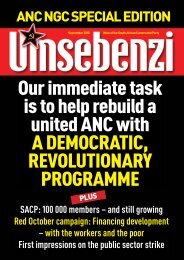Forward to Socialism!! - South African Communist Party
Forward to Socialism!! - South African Communist Party
Forward to Socialism!! - South African Communist Party
You also want an ePaper? Increase the reach of your titles
YUMPU automatically turns print PDFs into web optimized ePapers that Google loves.
24 Umsebenzi<br />
bail out the mining industry similar <strong>to</strong><br />
how our budget gets diverted <strong>to</strong> bail-out<br />
certain parastatals. The Alliance must<br />
also engage on the issue of the parastatals<br />
and development finance institutions on<br />
the role they should be structured <strong>to</strong> play<br />
in our development.<br />
In 1990, utat’uNelson Mandela in his<br />
first public address after release from<br />
Prison, said: Nationalisation of the mines,<br />
banks and monopoly industries is ANC<br />
policy, and any change <strong>to</strong> this policy is inconceivable”.<br />
On May Day 1994, utat’uNelson Mandela<br />
<strong>to</strong>ld the Sunday Times that, “In our<br />
economic policies … there is not a single<br />
reference <strong>to</strong> things like nationalisation,<br />
and this is not accidental. There is not a<br />
single slogan that will connect us with<br />
Marxist ideology”.<br />
The call by the ANCYL<br />
The ANCYL has raised the issue of nationalisation<br />
of mines sharply, supported<br />
by Cosatu and YCL. This should be appreciated<br />
as the new policy position of<br />
the ANCYL and those who support the<br />
call by the Youth League are invoking the<br />
Freedom Charter. Those within the<br />
Movement and government who are perceived<br />
<strong>to</strong> be against the call by the Youth<br />
League are arguing for a state mining<br />
company. The question is whether the<br />
two are different and opposed <strong>to</strong> each<br />
other? My personal view is that the two<br />
are not different. If government adopts<br />
the call by the ANCYL, it must then engage<br />
on the form and method of nationalising<br />
mines which will result in either a<br />
mining parastatal or state mining company.<br />
The challenge that must be managed<br />
organisationally, within the Alliance is<br />
policy development by leaders in public<br />
discourse and focussing on individuals<br />
rather than the issues. Unfortunately in<br />
this debate, the ANCYL seems <strong>to</strong> have<br />
taken a position of ostracising any person<br />
who either argues around the correct reference<br />
<strong>to</strong> the Freedom Charter or state<br />
mining company or mineral wealth being<br />
nationalised by the Mining Resources and<br />
Petroleum Development Act. Comrades<br />
should take this as the first and correct<br />
step ever taken by our government with<br />
pressure from unions – NUM in particular.<br />
This actually means that the state has<br />
legislative power <strong>to</strong> either empower<br />
workers or compel companies <strong>to</strong> compulsory<br />
community re-investment. Both the<br />
call by the ANCYL and those arguing for<br />
a state mining company should be welcomed,<br />
lest the call become populist and<br />
a political point scoring <strong>to</strong>ol behind either<br />
nationalisation of mines or the implementation<br />
of the Freedom Charter. This<br />
call has two critical stakeholders, mine<br />
workers and mining inves<strong>to</strong>rs, with different<br />
interests in the debate and how it<br />
finally unfolds. More energy should be<br />
dedicated <strong>to</strong> the class war- the weakest<br />
argument our class enemy uses is that nationalisation<br />
will scare and drive inves<strong>to</strong>rs<br />
away but strangely the same inves<strong>to</strong>rs<br />
have not disinvested in countries where<br />
similar initiatives are in place.<br />
Why is nationalisation or state<br />
mining company necessary?<br />
The Morogoro Strategy and Tactics document<br />
says: “In our country – more than<br />
in any other part of the oppressed world<br />
– it is inconceivable for liberation <strong>to</strong> have<br />
meaning without a return of the wealth<br />
of the land <strong>to</strong> the people as a whole. It is<br />
'The question is:<br />
are the two different and<br />
opposed <strong>to</strong> each other?'<br />
therefore a fundamental feature of our<br />
strategy that vic<strong>to</strong>ry must embrace more<br />
than formal political democracy. To allow<br />
the existing economic forces <strong>to</strong> retain<br />
their interests intact is <strong>to</strong> feed the root of<br />
racial supremacy and does not represent<br />
even the shadow of liberation”.<br />
The economic transformation in our<br />
country has <strong>to</strong> be shifted away from policies<br />
of only de-racialisation and these<br />
should be combined with policies that<br />
seek <strong>to</strong> change the fundamental economic<br />
ownership of the means of production.<br />
Government needs <strong>to</strong> move away<br />
from only ownership of the mineral rights<br />
beneath the soil and through its state<br />
mining company (<strong>African</strong> Exploration<br />
Mining & Finance Corporation (AEMFC)<br />
actively participate in the mining industry<br />
and maximise the national benefit<br />
from mineral development. Motivation<br />
for government <strong>to</strong> strengthen the operational<br />
capacity of AEMFC should be <strong>to</strong><br />
develop a new policy on explicit investment<br />
which will allow government <strong>to</strong><br />
channel a major part of the mineral revenue<br />
<strong>to</strong>wards development programmes<br />
and infrastructure development.<br />
The emphasis on the need for a concrete<br />
shift is based on the need for our<br />
mineral resources <strong>to</strong> help the country in<br />
respect of social infrastructure, especially<br />
in rural areas, stimulating education (free<br />
and compulsory education from grade R<br />
<strong>to</strong> a first degree), health care, housing, the<br />
rural electrification programme and sanitation.<br />
The CEO of AEMFC, Sizwe<br />
Madondo, said in Mining Weekly.com<br />
that <strong>South</strong> Africa’s new State-owned<br />
mining company was pursuing coal and<br />
uranium opportunities. Madondo said<br />
that drilling results in the Mpumalanga<br />
coalfield were expected before the end of<br />
December 2009 and steps were simultaneously<br />
being taken <strong>to</strong> secure State-held<br />
uranium rights in the Northern Cape. He<br />
said the pursuit of coal stemmed from the<br />
State-owned Central Energy Fund (CEF)<br />
– of which AEMFC was part – inheriting<br />
coal mineral rights from the previous government.<br />
The pursuit of uranium was a<br />
consequence of the <strong>South</strong> <strong>African</strong> government<br />
declaring uranium a national strategic<br />
resource.<br />
There is also a need <strong>to</strong> engage deeply<br />
on the model of nationalisation <strong>to</strong> be followed<br />
by our government, as a proclamation<br />
by Parliament <strong>to</strong> nationalise mines<br />
in <strong>South</strong> Africa will not resolve the developmental<br />
objectives required from the industry.<br />
Just by way of illustration, if we<br />
were as a country <strong>to</strong> develop our capacity<br />
December 2009


